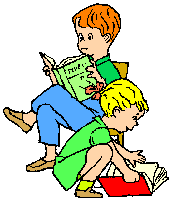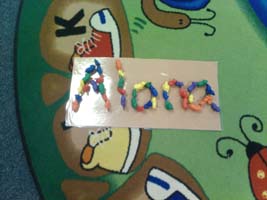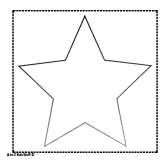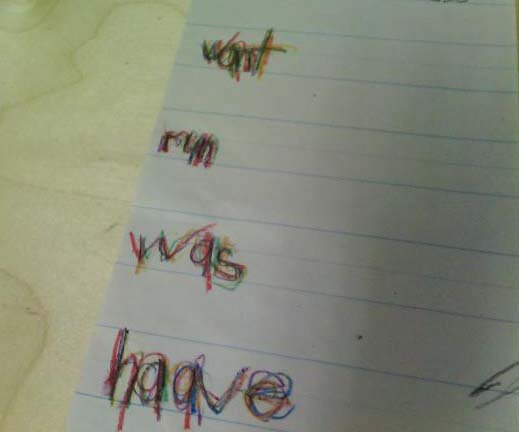Reading


Positional words
Bean Bag Words
under, beside, on top of, on
Give each child a bean bag. Have the children put the beanbag "on top of their head", "under their chin", "beside their shoe", "on their shoulder", etc.
To help children associate the written word with the spoken word.
*Name Recognition
Welcome Sign
Make a welcome sign for your classroom ( Welcome to Kindergarten--grade or room number). Print the childrens names all around the welcome sign.
Letters In Your Name

Write the child's name in big letters across a sheet of construction paper. Start with a capital letter than lowercase letters. Laminate. Lay the name strips on the floor around the room. The children find their name. Give the children small animals, uniflex blocks, or cubes to cover the letters in their name.
Find Your Name

Need: Hanging Pocket Chart, cardboard (the size of paint color sample
cards), camera.
Take a picture of each child. Print the child's name at the bottom of
the picture. Print the child's name on the cardboard strip.
Before the children arrive place their name cards on the area rug.
Place their pictures on the outside rows of a pocket chart.
When the children arrive they find their name card on the area rug
and place it next to their picture in the pocket chart. The name
cards left on the rug are the children who are absent. If you also
use name tags place a table by the pocket chart and after the
children place their name cards in the pocket chart they find their
name tags on the table.
Store the pictures and name cards in the top slots of the pocket chart.
Flower Names
Use this activity with 3 year olds and 4 year olds to practice name
recognition. Get paint stirrer sticks from the hardware store (can
ask for a donation).
Paint the paint stirrers green. Then make a flower head for each
child with their name on it (1st name for 3's and first and last for
4's). Laminate the flower heads.
Hot glue the heads to the green paint stirrer sticks to make a
flower. Then get a plastic flower pot (medium sized) and fill it 2/3
full of rice. When the children come to school in the morning they
find their flower and "plant" it in the flower pot. The
children love this
Colored Salt Names and Initials
Need: salt, food coloring, paper, paint brushes.
Place salt in a zip-locking bags (about one cup) add food coloring.
Close bag. Have children vigorously shake the bag until all the salt
is colored. Open the bag and spread the salt onto paper towels to dry.
Have children write their names or their initials using large paint
brush with slightly deluted white glue on paper. Immediately, have
them sprinkle on the colored salt. Let dry, then shake off the excess salt
Hand & Foot Book
To reinforce reading each other's names make a hand and foot book.
Paint 1 child's hands (or foot) and make a print. After it has dried,
put This is ________'s hand (foot). Then bound them together. Then
the children get them and compare hand size and names. They even take
the book to the attendance chart that has pictures and names to see
whose name is whose. Later they even use the hand and foot book to
copy names and letters. They always remind me to print the new children
in class so they can be a part of their favorite book.
Name Table
Scan photographs of each child in the group and place them, along
with the child's first name onto the writing/drawing table. Cover
each name and photo with clear contact paper so they don't get in the
way of the children working, and suddenly I have many children who
are interested in not only writing their own name but forming letters
and learning other children's names.
If you are unable to get the children's photos just print the names
on construction paper and place on the table. Cover with contact
paper. Later in the year change by adding the child's first and last
name to the table.
Name Star
Name headbands. Print children's name on the star. Have children cut along dotted lines.
Give children strips of constuction paper to decorate. Measure child's head with constuction paper strip and mark front center. Glue cut-out star to construction paper strip. Tape or staple together to make a headband.

Star in box (right click to save)
Hidden Name
Need: White crayon, white paper, water paints, paint brush
On the back of white paper print in small letters the child's name (so you will know who to give each paper to). On the front of white paper print the child's name with a white crayon. Give the children the papers and water paints. Tell the children to tell you when they have found something.
Learn Friends Names Songs
*Words
Rainbow Words

Turn weekly words into rainbow words. Print the word with a pencil then trace over the word with different colors of crayons until you have created rainbow words.
Learning To Read
Needed: Flash Cards and Bright Colored Markers
First write down an letter of the alphabet on each card. Then on the
back write a word that makes the sound of the letter, and underline
the beginning letter.
Have the children hold up their hands if they can identify the
letter. Then help each child make the sound of the letter. After they
have learned the sound have them sound off the word on the back of
the card.
Words such as D-Dog, E-Egg, F-Fog, etc... Then once they have
established this pattern, make up more words from one particular
letter or make a family of words, such as: the og family (fog, dog,
log, bog, frog, slog). And they will be off to reading in no time! Contributed By: Carla M. Nelson
Reading Wall
Start a "Reading wall" the children bring in anything from
their home that they can "read" such as a McDonalds bag or
a cereal box. Place it on the "Reading Wall" as something
that they can read. The children will love the idea that they can
"read" these words!
Personalized Book (journals)
Let children begin to “write” and illustrate their own
books from an early age. Here is all you need to make the book cover:
2 same size sturdy pieces of cardboard
metal hole punch
1 piece of scrap cloth per cover sheet to wrap hospital corner style
of each piece of cardboard then spray mount a piece of paper on the
inside covers. Spray Mount works best and should be used all over the
front cover fabric for durability. school glue or spray mount pretty
ribbon or yarn or those metal rings that come in all sizes-really
anything to hold it together and make the pages easy to turn paper of
the color and amount of pages of your choice.
Children as young as 2 or 3 enjoy illustrating their own books that
they can look at over and over. At that young age, you could also use
construction paper with a laminate or contact paper cover and hole
reinforcers. By March in PreK4, my children cannot wait to finish
snack and at their own pace find their journals and a comfy seat to
write and draw in. Be sure there are lots of picture books with
corresponding words and labels with pictures all over your classroom.
The excitement they feel in “reading” and sharing their own
books with everyone begins to build a love for writing that can last
a lifetime. Do not worry about misspelling at this stage unless the
child asks you specifically to spell a word for them.
One VERY important tip: do not write or draw in their journal unless
they specifically ask you to write in a word. Sometimes it is best to
write it on the chalkboard and see how well they transfer it to their
own paper. The point is they made it and they own it! Contributed By : Betsy G.
Picture Board
To help children associate the written word with the spoken word, use
this exercise:
Look for interesting pictures in magazines, cut them out and mount
them. Choose one and hang it in the classroom for a couple days
without comment.
Then ask the children if they have noticed the picture and what they
think about it. Take down their comments and post them with the
picture. I have used one of the milk ads (famous people with milk
moustaches), a GAP ad (with a cute kid), animal pictures, etc.
Reading Tree
To inspire preschool children and excite them about literature build
a reading tree every month. For every book you read you add a leaf to
the tree.
Tape a paper tree trunk in a centrally located area. The leaves of
the tree are tied into the calendar, for example, for March use
shamrock leaves.
As you read a book or two daily write the title of the book on the
"shamrock" then tape it to the wall above the trunk. Slowly
the tree grows as the month goes on. The children love this and
become so excited! They often will remind you to fill out the leaves
for the day and they participate in hanging the leaves on the tree!
Puppet Story
Collect puppets, stuffed animals and toys for all the animals in
Brown Bear, Brown Bear. Let each child choose a toy and
"read" that part of the book as the teacher turns the
pages. Later, put out lots of different toys and let the children
make up their own parts as the teacher writes them down. The children
draw the pictures and we make our own book.
Writing Center
Add a writing center in your room, but call it "The Office."
This is a very motivational title for the children. Have a telephone
there and lots of writing materials (i.e. pencils, markers, colored,
pencils, seasonal pens, etc.). Also place stencils, paper, children's
dictionaries and old order forms there. They love to go and play
office and they are experiencing literacy while they are there. This
will be a very popular center in your room.
Story Time Notice
Start your circle session every morning with the children sitting
facing the easel - I sit alongside it - and as they watch I model
writing by printing up our notice for the day.
Today's notice read as follows:
"Good morning my little wiggle worms. Today is Thursday, the 9th
of October, 1999.
Could you please make sure that you finish off your apple picture and
start the one for the letter B. Don't forget to start joining the
broken lines where the x is."
You could type up each day's notice and add pictures for clues.
Children love trying to guess what each days notice says.
Children will begin to write and post their own notices on the easel
for you to guess and read out to the class.
Baggie Book
Staple six baggies together at the bottom of the bags and put a strip
of masking tape or colored tape over the staples to form the spine of
the book.
Cut pieces of tagboard or construction paper an appropriate size for
fitting into each baggie.
Let children dictate and illustrate a story to go on the pages and
then place them in proper sequence inside the baggies.
Stories can be changed easily by removing current pages and replacing
with a new story.
Popular stories can be used as models for children to imitate, for
example, Brown Bear by Bill Mortin can be Black Cat.
*Listening Skills
Sheep Hide-and-Seek
Learn several nursery rhymes about sheep--Little Bo Peep, Mary had a
Little Lamb and Baa Baa Blacksheep. Make small tagboard sheep and put
each child's name on a sheep.
Then hid them around the room (under the table, behind the door, in
the blocks,etc.) Then gave each child verbal instructions where to
find their sheep. It really reinforced listening skills and they
really had fun playing the game.
Following Orders
Have the children stand around the square. Now give commands, such
as: Jump inside of the square. Hop up and down on both feet. Leap out
of the square. Hold hands and walk around the square. Continue on
with seven or eight more commands.
Game A-Jump
(Invite the children to form a circle. Perform the actions in the
song. Encourage children to create their own verses with actions.)
A-jump, a-jump, a-jump,
a-turning around and then,
A-jump, a-jump, a-jump,
a-turning around again.
A-clap, a-clap, a-clap...
(in the above verse replace A-jump with a-clap)
A-slide, a-slide, a-slide...
*Tips and Tricks
To help children recognize words. Label items throughout the room
with paper signs. Such as place the word chair on the chairs. Label
the shelves, door, window, cabinet...
_____________________________________________________________
Follow Us
Click here to include your favorite reading activity in this theme!
|





